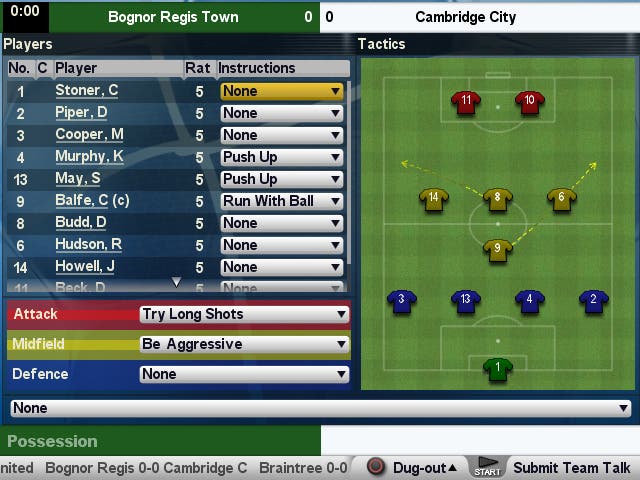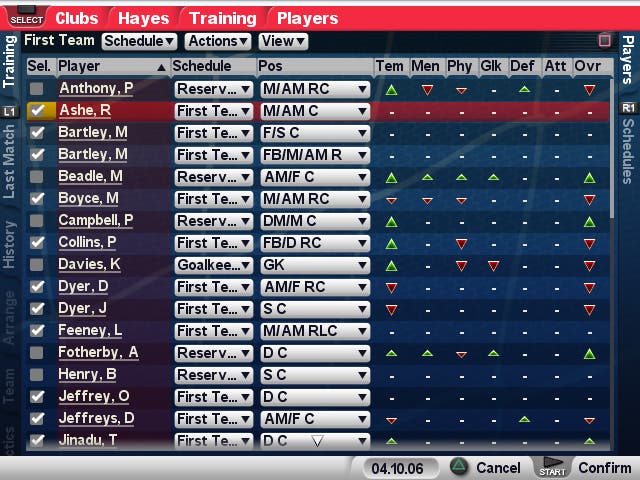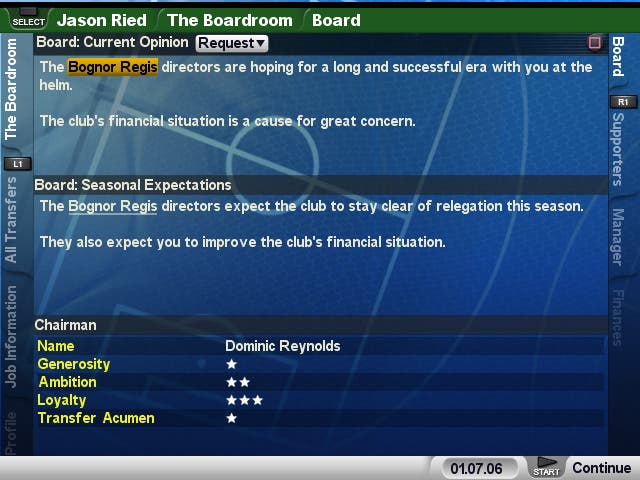Championship Manager 2007
Nice try, good conversion - oops, wrong sport...
Why is it that every time we play A,N. Other management game we feel the urge to talk about Football Manager, to compare it to by far and away the leading title in the genre?
It's not as if we expect every shooter we play to measure up to Halo. In other genres it's ok to be good, but not brilliant - and yet it seems in football management second is nothing.
Actually, the reason we're always sizing up boss sims like two competitive starlets comparing their tackles in the shower is that management games are in many respects so similar to SEGA's top dog.
So why aren't they as good?
Certainly the feature list of Champ lags behind FM's - there are no feeder clubs, for instance, and under-developed media and manager interaction and, in this PS2 version, no ProZone post-match analysis tool to please the laptop brigade.
But all of these reasons don't explain why the PS2 conversion - as sound as it actually is - of a PC game that's developed with no little effort and plenty of passion is no Football Manager.

It's often said that that the real reason it lags behind FM is that Champ Man lacks soul - which is a lazy way of saying 'it's like Football Manager, but not as good and we're damned if we know why'.
We'll tell you why. Because, it may surprise you to learn, there's one dead simple reason Champ is no FM... reputation.
No, we're not talking about the kudos of the developers, but an in-game dynamic that drives everything that's good about FM and threatens to undermines all of the good things Champ undoubtedly does.
In FM a player's value is linked directly, and very cleverly, to how they're perceived at any given time. If they're languishing in the reserves and not performing tp their potential because you've selected them out of position, their value will hold for a while, then sink faster than Leeds United's top-flight aspirations.
On the other hand, a player in form, even banging in goals against lesser teams or being favoured by your tactics, will - with a bit of inertia for added realism - eventually start to become more valuable.
Sounds too simple to be true? But think about it: what makes Champ Man PS2, a worthy conversion of an improving PC game which is perfectly good fun for settee-bound managers, so frustrating at times?
A lot of it boils down to the transfer market, which is your greatest opportunity to effect big changes in the fortune of your side with one fell swoop, and the area most affected by player reputation.

In Champ Man PS2, the transfer market seems lifeless. It's peopled by players who are worth, well, exactly what they should be worth: world class defenders on the market for £5m, ten per cent more than a player who's exactly 10 per cent worse.
There's no incentive there to get hunting for a bargain basement player who's lowly status or alienation from a club's setup mean he's severely undervalued.
There's no real motivation to take youngsters and mould them into good players you can sell at a profit, no reason to sell a player when he's worth double what you paid so you can draft in two newcomers...
We could go on for 1000 words telling you that Champ Man ticks box 'a' with decent text commentary and a passable isometric match engine, or checks box 'b' by giving you the welcome chance to customise your set-pieces... But why bother when you now know why it's no Football Manager, and will never be as compelling, immersive and inexplicably (well, explicably) addictive?
Well, because as important as the reputation factor is, the other facets of a management game are obviously still important when it comes to generating that sensation of being sat in dugout with 50,000 people baying for your blood.
Champ Man PS2 is pretty much a fully-featured conversion of it's Windows counterpart and does a decent job or representing the financial, fan and selection pressures on a boss.
Notable absences from the feature list are the afore-mentioned ProZone, which is no great loss as PC devs Beautiful Game Studios game still needs to turn this statistical analysis tool into something truly worthwhile from a gameplay point of view.

Player interaction is dramatically reduced too, so it's harder to put your arm round a youngster who needs a cuddle, or put a rocket up a veteran who's getting too big for his boots. And contract negotiations are more abrupt than Alex Ferguson after being approached by a BBC reporter for an interview.
Of the small tweaks and additions, nothing stands out as a title winning feature either. The quick match button will especially displease purists as this tool means games aren't played out in the proper match engine - which somehow devalues the results.
User interface wise, the game is even more of a hot and miss affair, with a scrollable menu running on its side on the left 'complemented' by sub menus on the right. The distance between these too, and the illegibility of the text make this a pretty useless setup. Fortunately, you can use and old fashion drop down menu by jamming the SELECT button.
For all this, CM is still about as good as it gets on PS2 for management fans.
Oh God - have we kicked it? We certainly didn't mean to. Champ Man is a solid managerial offering that stands alone as a well-researched and reasonably engaging management game. It compares favourably with the more in-depth PC version, but at this rate it'll never be a FM-beater - which matters not if you only have a PS2 and your dad monopolises the home PC to access specialist websites...







